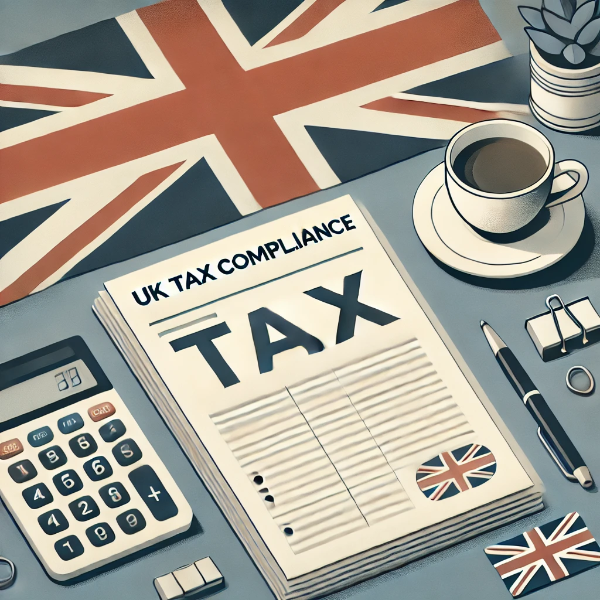Tax Compliance Checklist for Small Businesses in the UK
Finding the way round in the UK tax environment is crucial for small business owners seeking to ensure compliance and avoid expensive penalties.
This comprehensive checklist will guide you through the essentials of UK tax compliance, equipping your business with the necessary knowledge to operate smoothly.

Understanding UK Tax Obligations
Small businesses in the UK are required to adhere to specific tax obligations based on their structure and operations:
- Corporation Tax: Levied on company profits, the Corporation Tax must be paid nine months and one day after the end of your accounting period. For a company with a fiscal year ending on 31 March, the payment would be due by the following 1 January.
- Value Added Tax (VAT): Businesses must register for VAT if their taxable turnover exceeds £90,000. Considering the possibility of changes in fiscal policies, it’s critical to verify this threshold regularly. VAT involves charging VAT on sales, submitting quarterly returns, and remitting any VAT due.
- PAYE and National Insurance: These are taxes deducted from employees' wages alongside employer contributions.
- Self-Assessment: Essential for sole traders or partners, requiring annual filing of self-assessment tax returns. Ensure paper returns are submitted by 31 October and online returns by 31 January.
Understanding your specific obligations, registration requirements, and deadlines is important for maintaining compliance.
Record Keeping and Documentation
Accurate record-keeping forms the backbone of tax compliance. Key documents to maintain include:
- Invoices and receipts for all income and expenses.
- Bank statements and cheque stubs.
- PAYE records for employees.
Digital tools like QuickBooks, Xero, or FreeAgent help organise records and simplify the tax filing process.
Filing and Payment Deadlines
Staying organised with deadlines is vital for compliance:
- 31 January: The deadline for online self-assessment return submissions.
- Corporation Tax Payment: Due nine months and one day after the end of your company’s financial year.
- Quarterly: VAT returns are to be submitted according to your VAT accounting periods.
Setting digital reminders can help manage these deadlines efficiently.
Deductions and Allowances
To minimise tax liability, leverage available deductions and allowances:
- Annual Investment Allowance (AIA): Currently at £1 million, the AIA allows for full deductions on qualifying capital expenditures. Stay informed about any changes in this limit due to government budget alterations.
- Research and Development (R&D) Relief: Available for ventures advancing scientific or technological fields. Eligibility requires demonstrating efforts to overcome scientific or technological uncertainties.
- Business Rates Relief: Offered for properties solely used for business. Eligibility and relief types depend on business size and sector. Recent updates should be checked on HMRC's site.
Utilising these deductions and allowances systematically helps optimise your tax efficiency.
VAT Compliance
VAT can be complex and requires understanding of:
- Registration Threshold: Compulsory registration for firms with turnover over £90,000, with an option for voluntary registration below this.
- Accurate Reporting: Ensure every sale and purchase is precisely recorded.
- Flat Rate Scheme: Simplifies VAT payment; eligibility requires a turnover below £150,000 (excluding VAT) with the rate differing by industry.
Implementing rigorous VAT record-keeping and punctual filing is critical.
Payroll and PAYE Compliance
Employing staff triggers PAYE and NIC compliance responsibilities:
- Employer Registration: Register as an employer with HMRC to receive the necessary reference numbers for PAYE.
- Deduction Accuracy: Ensure the exact tax and NI are deducted and reported.
- Record Maintenance: Keep payslips, payment records, and employee details for a minimum of three years.
Adopting payroll software or services can help automate and ensure accurate compliance with PAYE requirements.

Self-Assessment and Corporation Tax
Small businesses must diligently navigate:
- Self-Assessment: Timely submissions of paper (due by 31 October) and online (due by 31 January) returns.
- Corporation Tax Returns: Preparing and submitting CT600 forms annually with payments due nine months and one day after the fiscal year concludes.
Timely and accurate filing is necessary to avoid fines and interest charges.
The Role of an Accountant
Engaging a professional accountant offers significant advantages:
- Expert Advice: Accounts provide strategies for tax planning, maximizing savings, and ensuring compliance.
- Efficient Tax Return Preparation: Their expertise ensures prompt and correct tax submissions.
- Business Growth Guidance: Beyond taxes, accountants deliver comprehensive financial planning advice, aiding in business expansion.
Conclusion
Ensuring tax compliance is a fundamental aspect of successfully running a small business in the UK. Following this checklist can help business owners achieve compliance and optimise tax efficiency. Professional accountants further safeguard against costly errors and assist in broadening financial planning strategies.
Additional Resources
- HMRC Website:
- Digital Tools: Tutorials on platforms like Xero and QuickBooks for seamless record-keeping.
By staying informed and organised, small business owners can confidently navigate the UK tax environment, allowing a greater focus on growth and innovation.
